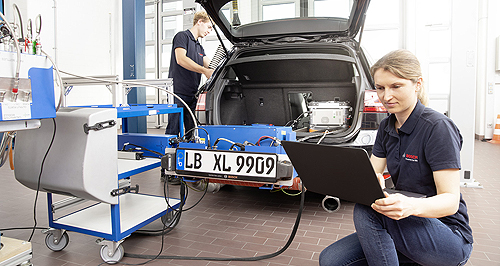News - BoschBosch claims major diesel emissions breakthroughGood oil: Bosch claims its new diesel technology can cut NOx emissions by up to one-tenth of the required 2020 limit. New diesel technology can reduce emissions to well below future limits, says Bosch30 Apr 2018 GERMAN engineering giant Bosch is claiming it has developed new technology for diesel engines that can reduce the level of nitrogen oxides (NOx) in exhaust emissions to one-tenth of the limit required from European regulations coming into effect in 2020. According to Bosch, the changes have been achieved by refining existing technologies, which can reduce NOx emissions to as little as 13mg per km, and as little as 40mg per km when driving in “challenging” urban conditions. Currently, European regulations require diesel vehicles to emit no more than 168mg/km, which will be reduced to 120mg/km in 2020. Bosch claims the changes have been achieved by tweaking existing technologies such as the air-flow management system, turbocharger and exhaust gas temperatures. While the developments have not been explained in detail, Bosch says a new air-flow management system, comprising of a highly responsive, low-friction turbocharger, combats aggressive driving styles that typically raise vehicle emissions. Also helping maximise NOx conversion is an exhaust gas management system which regulates temperatures and allows for a balance where the exhaust system stays hot enough to efficiently burn pollutants while keeping the exhaust temperature in a stable range. For NOx to burn efficiently, exhaust gases must be hotter than 200 degrees, a figure that is often not achieved in stop-start urban driving. Bosch says its new system will be able to keep the system at 200 degrees without any extra heating, such as from a 48V auxiliary heater. The last change comes from refining fuel injection technology, an area in which Bosch has plenty of expertise, having developed fuel-injection systems since the 1930s. In testing the new technology, Bosch used a fleet of 22 Volkswagen Golf models equipped with a 1.7-litre turbo-diesel engine, with the results prompting Bosch CEO Volkmar Denner to claim there is life yet for diesel engines. “There’s a future for diesel. Today, we want to put a stop, once and for all, to the debate about the demise of diesel technology,” he said. “Equipped with the latest Bosch technology, diesel vehicles will be classed as low-emission vehicles and yet remain affordable.” It is claimed that the technological advances have no detriment on the diesel engine’s CO2 production or fuel efficiency, however no mention has been made on whether engine outputs are altered by the new technology. Given the new breakthroughs use existing engine technology, Bosch says the new technology can be implemented on new vehicles effective immediately, however it cannot be retrofitted on existing vehicles. Bosch also anticipates that the use of artificial intelligence can further boost the efficiency of combustion engines, to the point where, with the exception of CO2, they will have effectively no impact on the ambient air. Mr Denner said his future aim for Bosch engineers will be to develop a new generation of diesel engines that produce no significant particulate or NOx emissions. He also called for a review of CO2 emissions testing, saying they should be carried out in real-world driving instead of in a lab, which he said would result in greater transparency for consumers and a renewed focus on climate action. Mr Denner added that CO2 emissions testing should extend beyond just fuel use, saying: “We need a transparent assessment of the overall CO2 emissions produced by road traffic, including not only the emissions of the vehicles themselves but also the emissions caused by the production of the fuel or electricity used to power them.” Bosch stressed that for the new technology, incorporating software that detects test cycles is “strictly forbidden”, and that Bosch products must not be optimised for test situations. The company’s software was used in the Volkswagen diesel vehicles that were found to be cheating emissions results in the 2015 Dieselgate scandal. It remains unclear when the new technology will be rolled out in production vehicles, however given the components already exist in today’s vehicles, a lengthy wait is not expected.  Read more30th of January 2018  German trio face criticism over monkey diesel testsMonkeys tested in diesel emissions study funded by Volkswagen, Daimler, BMW4th of January 2018  Vehicle CO2 emissions D-Day loomsMotor industry, federal government thrash out CO2 emissions cut target |
Click to shareBosch articlesMotor industry news |




















Facebook Twitter Instagram